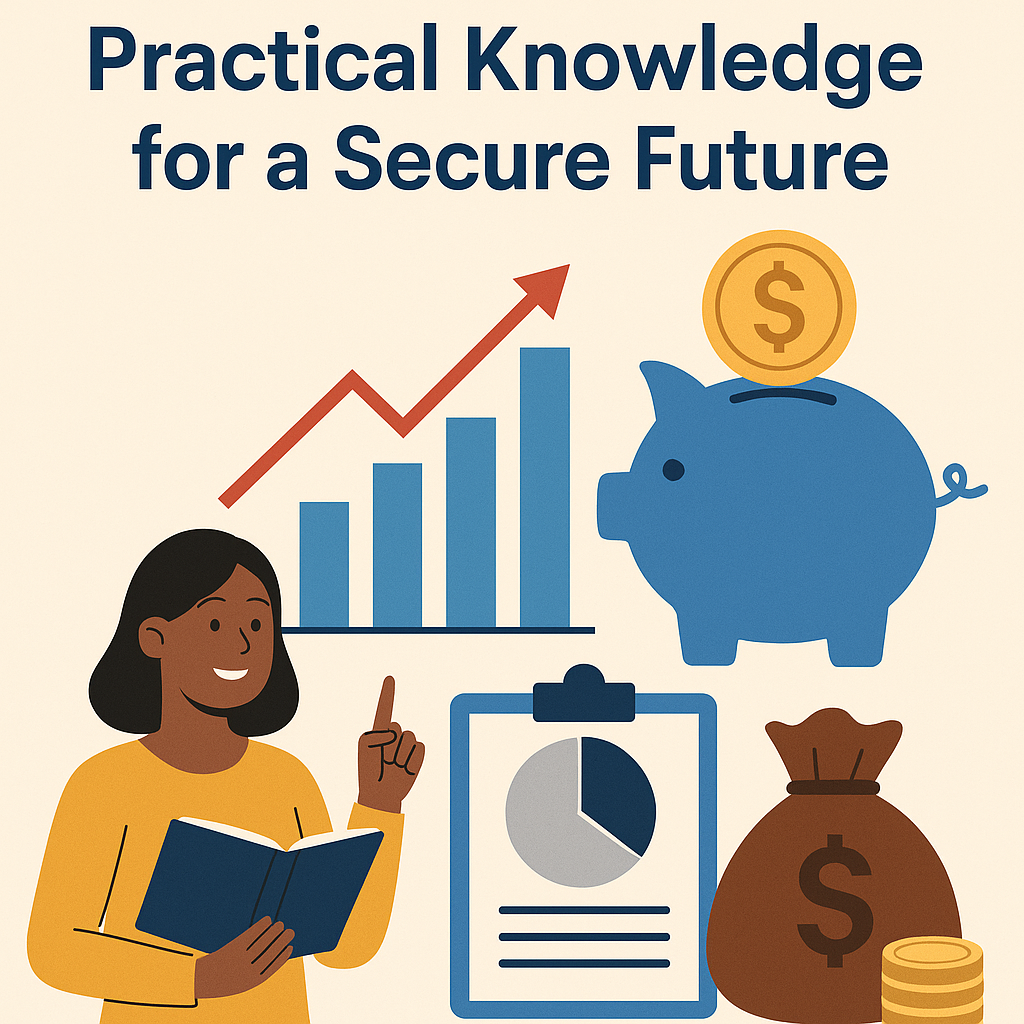Financial Education: Practical Knowledge for a Secure Future
Financial education is the foundation for a secure and successful future. In today’s fast-paced world, managing money wisely is not just a skill—it’s a necessity. From understanding how to create a budget to learning how investments work, financial education empowers individuals to make informed decisions about their money. This comprehensive guide provides practical insights and strategies that anyone can use to gain control over their finances and build a more secure life.
1. Why Financial Education Matters
Empowerment Through Knowledge: Learning about money helps you take control of your financial life. Whether you’re managing bills, planning for retirement, or trying to grow your wealth, financial literacy equips you with the tools you need to make smart decisions.
Avoiding Debt and Financial Stress: Without a solid understanding of money, it’s easy to fall into debt traps and live paycheck to paycheck. Financial education helps you avoid common pitfalls, reduce stress, and improve overall quality of life.
Building Confidence: When you understand how finances work, you’re less likely to be taken advantage of and more likely to feel confident in every financial step you take.
2. Budgeting: The Foundation of Financial Control
What is a Budget? A budget is a plan for how you will spend and save your money. It helps you understand your income, track expenses, and ensure that your financial goals are achievable.
Popular Budgeting Methods: Consider using methods like the 50/30/20 rule (50% needs, 30% wants, 20% savings), zero-based budgeting, or the envelope method to manage your finances efficiently.
Why Budgeting Works: With a solid budget in place, you gain clarity and control over your spending, reduce wasteful expenses, and increase your ability to save and invest.
3. Saving Strategies for a Secure Future
Emergency Fund: Building an emergency fund is crucial. It protects you from unexpected costs like car repairs, job loss, or medical expenses—preventing you from relying on credit cards or loans.
Short-Term vs. Long-Term Savings: Set aside money for short-term goals (e.g., travel, gadgets) and long-term needs (e.g., retirement, home purchase). Use separate savings accounts or tools like CDs and high-yield savings accounts.
Automate Your Savings: Set up automatic transfers to make saving consistent. Even small regular contributions grow significantly over time.
4. Investing for Growth
Start Early: The sooner you start investing, the more time your money has to grow through compound interest. Time is your greatest asset.
Diversify Your Portfolio: Spread investments across stocks, bonds, mutual funds, ETFs, and real estate to reduce risk and maximize potential returns.
Understand Risk: Higher returns often come with higher risks. Match your investments to your goals, timeline, and risk tolerance.
Useful Platforms: Beginners can start with platforms like Robinhood, Wealthfront, or Vanguard for user-friendly investing experiences.
5. Managing and Eliminating Debt
Good vs. Bad Debt: Not all debt is harmful. Student loans and mortgages can be considered good debt if managed wisely. However, high-interest credit cards and payday loans are considered bad debt.
Debt Repayment Methods: Use the snowball method (pay off smallest debts first) or the avalanche method (pay off highest-interest debts first). Stay consistent and avoid accumulating more debt.
Negotiate and Consolidate: Consider negotiating lower interest rates or consolidating debt into a single, lower-interest payment plan.
6. Common Financial Mistakes to Avoid
Living Without a Budget: Without a budget, it’s easy to overspend and lose track of where your money goes. Always know your numbers.
Neglecting Emergency Funds: Many people skip this step, only to regret it when faced with financial crises. Prioritize saving for emergencies before investing.
Overusing Credit Cards: While convenient, credit cards can lead to debt traps if not managed carefully. Use them wisely and pay off balances monthly.
Ignoring Retirement Planning: Waiting too long to save for retirement means missing out on compounding interest. Start now, even if it’s small.
Impulse Spending: Emotional or impulsive purchases can derail your goals. Wait 24 hours before major purchases and stick to a shopping list.
7. Recommended Tools and Resources for Financial Literacy
Books: Start with these classics: “The Richest Man in Babylon” by George S. Clason, “Your Money or Your Life” by Vicki Robin, and “I Will Teach You to Be Rich” by Ramit Sethi.
Free Courses: Explore quality financial courses on Khan Academy, Coursera, and edX.
Finance Apps: Track and manage your money using Mint, YNAB, and Personal Capital.
Podcasts & Videos: Follow personal finance podcasts and YouTube channels such as The Dave Ramsey Show or Graham Stephan for practical advice.
8. Final Thoughts: Your Financial Future Starts Today
Taking control of your financial life is one of the most empowering actions you can take. With the right knowledge, consistent habits, and commitment to growth, anyone can build a solid financial foundation. Whether you’re starting your journey or leveling up your skills, financial education is a lifelong investment that pays dividends in security, freedom, and peace of mind.
Ready to begin? Use the free resources below to kickstart your journey.
📥 Download Your Free Financial Planning Guide (PDF)
To make things easier, we’ve compiled the key concepts of this article into a downloadable PDF guide.



Leave a Reply